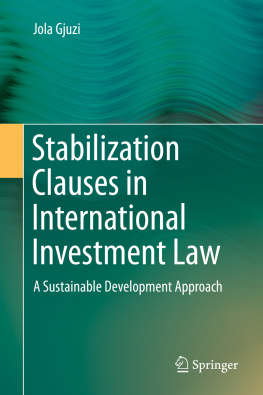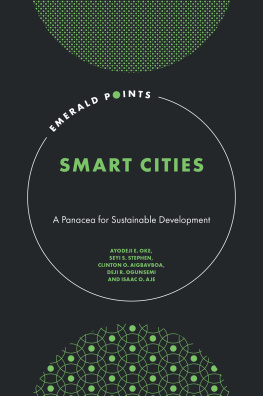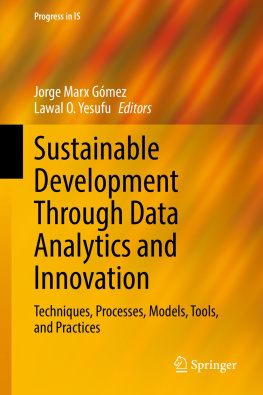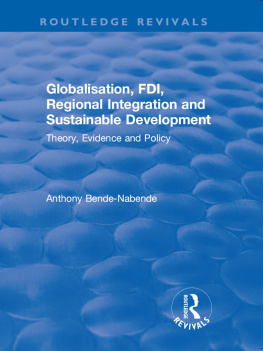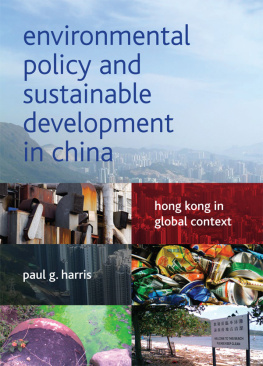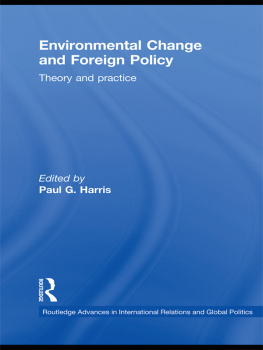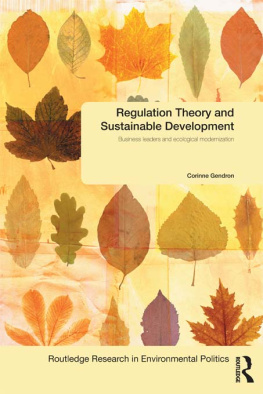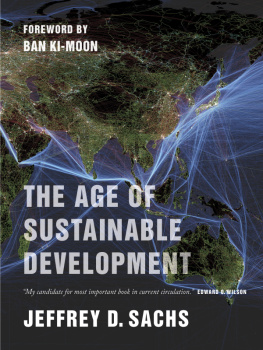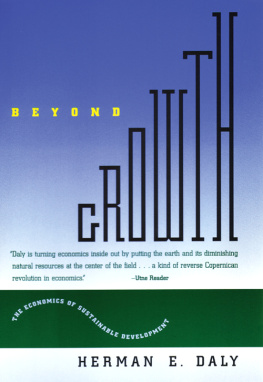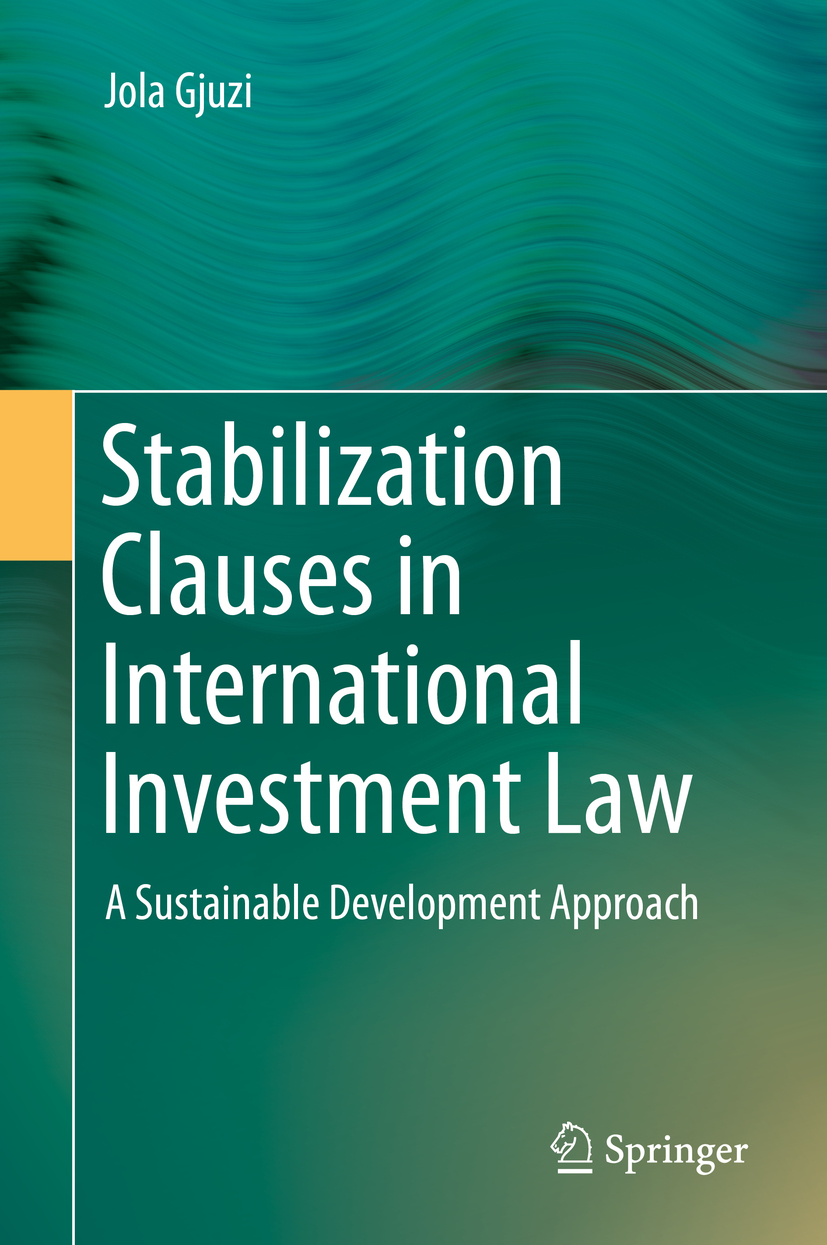Jola Gjuzi
Stabilization Clauses in International Investment Law A Sustainable Development Approach
Jola Gjuzi
Kalo & Associates Law Firm, Tirana, Albania
ISBN 978-3-319-97231-2 e-ISBN 978-3-319-97232-9
https://doi.org/10.1007/978-3-319-97232-9
Library of Congress Control Number: 2018952650
Die vorliegende Arbeit wurde im August 2016 als Dissertation an der Bucerius Law School Hochschule fr Rechtswissenschaft angenommen. Die mndliche Prfung fand am 22. Februar 2017 statt. Erstgutachter: Prof. Dr. Jrn Axel KmmererZweitgutachter: Prof. Dr. Stefan Krll
Springer Nature Switzerland AG 2018
This work is subject to copyright. All rights are reserved by the Publisher, whether the whole or part of the material is concerned, specifically the rights of translation, reprinting, reuse of illustrations, recitation, broadcasting, reproduction on microfilms or in any other physical way, and transmission or information storage and retrieval, electronic adaptation, computer software, or by similar or dissimilar methodology now known or hereafter developed.
The use of general descriptive names, registered names, trademarks, service marks, etc. in this publication does not imply, even in the absence of a specific statement, that such names are exempt from the relevant protective laws and regulations and therefore free for general use.
The publisher, the authors and the editors are safe to assume that the advice and information in this book are believed to be true and accurate at the date of publication. Neither the publisher nor the authors or the editors give a warranty, express or implied, with respect to the material contained herein or for any errors or omissions that may have been made. The publisher remains neutral with regard to jurisdictional claims in published maps and institutional affiliations.
This Springer imprint is published by the registered company Springer Nature Switzerland AG
The registered company address is: Gewerbestrasse 11, 6330 Cham, Switzerland
Preface
An imperative of international investment law is to ensure the protection of foreign investors from unfavorable host states conduct. Stabilization clauses are an essential instrument to achieve such protection. The foundation of stabilization clauses is however challenged by the inherent tension between two legitimate courses: the quest for guaranteeing the legal security of foreign investment and the need to preserve the host states freedom to protect the public interest. This challenge is evidenced by the antinomy between the host states stabilization promises undertaken toward foreign investors for maintaining the stability of the legal and contractual regime governing their investment projects and the host states commitments undertaken toward their citizens for continuously regulating areas of environmental protection and social welfare.
Arguably, such an antinomy may be intensified further by the increasing presence in international and national law of the concept of sustainable developmenta development paradigm that aims at the integration and balancing of economic development, environmental protection, and social welfare objectives. This concept could serve as the rationale and/or justification for the host states to exercise their power to regulate.
This book addresses and attempts to reconcile the stabilization clause/regulatory power antinomy in international investment law. In addition to examining the traditional and contemporary legal discourses over stabilization clauses, which constitute the foundation of this work, the book defines the actual legal dimension of the concept of sustainable development in international and national law and explores the potential role that this concept can have in such a reconciliation effort. It then endorses the thesis that sustainable development, if approached constructively, has the potential to mitigate the negative effects of stabilization clauses on the host states power to regulate environmental and social areas and thus to reconcile the identified antinomy.
This book is the result of my doctoral studies at Bucerius Law School, Hamburg, Germany. The idea of writing it dates back to my Master of Law and Business (MLB) studies at Bucerius Law School and Otto Beisheim School of Management, where I delved into the disciplines of international investment law and international arbitration.
I am indebted to Prof. Karsten Nowrot for his inspiring insights on international investment law and for introducing me to the contemporary legal discourse over stabilization clauses. Next, my profound gratitude goes to Prof. Clifford Larsen, Dean of the LLM/MLB Program, for his invaluable encouragement and support over the years of my doctoral research at Bucerius Law School. I am equally grateful to my supervisor and first examiner Prof. Jrn Axel Kmmerer. This book would not have been realized without his academic support and guidance through complex and often disputed legal issues. Much appreciation goes also to my second examiner, Prof. Stefan Krll, for his openness and valuable thoughts during our discussions.
My work at the international arbitration practice of Luther Rechtsanwaltsgesellschaft in Hamburg was also a great opportunity for enriching my doctoral project with practical insights.
I particularly remain thankful to the German Academic Exchange Service (DAAD) and the Excellency Fund of the Albanian Government for the financial support of different periods of my doctoral research in Hamburg, Germany. I am also grateful to the staff of Bucerius Law School, particularly the librarians of the Hengeler Meueller library, as well as to the librarians of the University of Hamburg, Max Planck Institute for Comparative and International Private Law, and ZBWLeibniz Information Centre for Economics.
I finally wish to thank wholeheartedly Magdalena Kaljaj and her family for making Hamburg my second home, as well as other colleagues and friends who supported me in accomplishing this project.
I dedicate this book to my husband, Plarent Ruka, for his love and encouragement, as well as to my parents and my brother for their support and confidence.
Jola Gjuzi
Tirana, Albania
April 2018
Table of Cases
(Unless otherwise indicated in this Table of Cases , the text of arbitral awards publicly available can be found in one of the following websites: ICSID https://icsid.worldbank.org ; Investment Treaty Arbitration http://www.italaw.com ; NAFTA Chapter 11 (Investment) Awards (NAFTA parties websites): Foreign Affairs, Trade and Development Canada http://www.international.gc.ca ; US Department of State: http://www.state.gov ; Mexican Secretary of Economy: http://www.economia.gob.mx ).
International Investment Treaty and Contract Cases
ADF Group Inc. v. United States of America , ICSID Case No. ARB (AF)/00/1, Award, 9 Jan 2003
AES Summit Generation Limited and AES-Tisza Erm Kft v. The Republic of Hungary , ICSID Case No. ARB/07/22, Award, 23 Sept 2010 [ AES v. Hungary , Award, 2010]
Agip Spa v. Peoples Republic of the Congo , ICSID Case No. ARB/77/1, Award, 30 Nov 1979 (reprinted in 21 ILM (1982) 726 (reproduced from an English translation of the French text as it appeared in LXIV (4) Rivista di Diritto Internazionale, Volume (1981), 863-879) [

